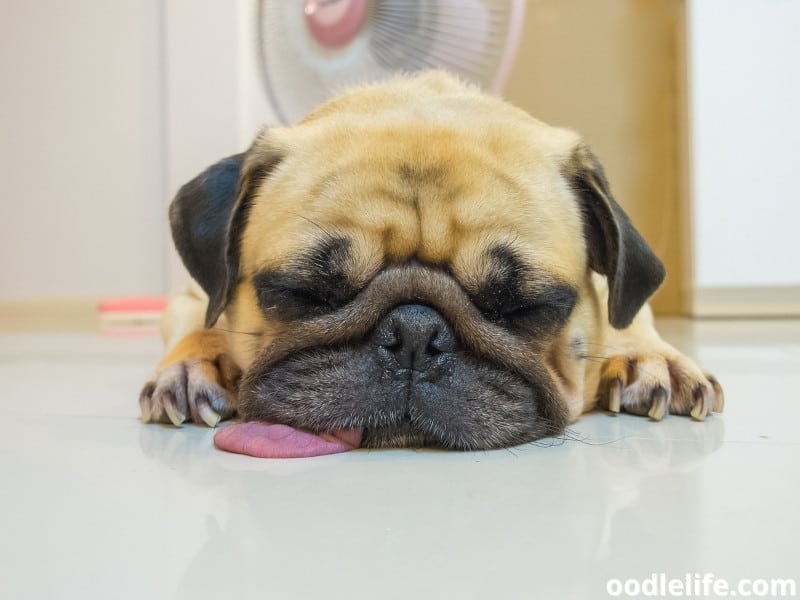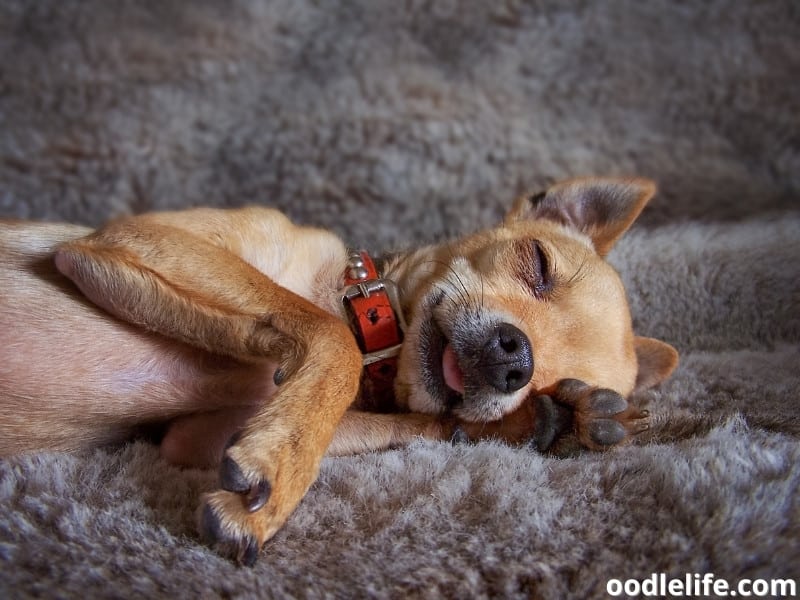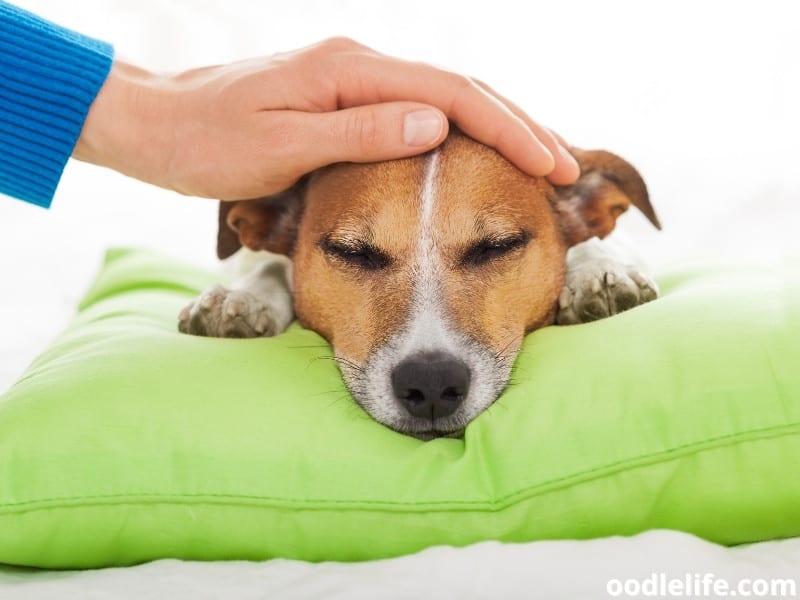Your Dog Is in Pain or Experiencing Discomfort
Your dog could be growling to signal that something is off or something hurts. When you try to move your dog, especially if they are heavy, it can cause discomfort if you awkwardly shift their body. Also, some dogs just don’t like to be touched, making them uncomfortable to get moved.
Perhaps a dog trainer can help you teach your dog to move by themselves to a new spot if they’re in your way. It could take a couple of weeks before it sticks, but it’ll get them used to needing to move if they fall asleep in a forbidden area.

When dogs fall into a deep sleep, it’s well within the realm of possibility that they are dreaming about something that feels real to them. Consequently, they may make noises such as growling and howling.
These behaviors and dreams typically occur when dogs are in a particular stage of sleep, referred to as rapid eye movement. Therefore, if you suspect that this is why your dog is making noises while they’re sleeping, then allow them to continue sleeping.
Perhaps you’ve seen videos where dogs are barking or even running in their sleep. Growling is in the same ballpark!

Certain ailments could cause your dog to start growling at you. Neurologic conditions, seizures, and other health problems might cause fatigue, dizziness, and being unbalanced.
These problems can become further exacerbated when you break their sleep cycle. For example, waking a dog up and causing them to feel like their equilibrium is off or if they have a small seizure (that you might not even notice) could warrant a growl or two.
Some breeds are more susceptible to these situations, such as Poodles, Beagles, and Golden Retrievers. If they seem unsteady to you and you think that’s the reason they growl each time you move them, consult a veterinarian for recommendations on the best way to proceed.

Dogs are just like us when it comes to sleep and relaxation. If your dog is completely laid out and in deep sleep or highly relaxed when you touch them, there’s a good chance that you can scare them if you try to move their body.
For many dogs, growling is a part of their response when they get startled. One way to tell if this is the reason they growled is to see how they react when you initially touch them. If they flinch when you move them and start growling, it’s probably because you scared them and caught them off guard.

Like many dogs, Lido was a little confused about his place in the world. Growling at his people, or any other person for that matter, is sort of like a business owner screaming at their clients. Making clients happy is how you run a successful business, pay my rent, utilities and food bills. It is how a business owner survives, and they know it. Likewise, if Lido clearly understood that his people are the key to his survival (as they provide the food, water, toys, attention, etc.) then it would be much less likely that he would risk upsetting them (and therefore not benefitting from their ability to share their resources) by behaving aggressively towards them.
1. Get Lido on a Learn to Earn Program: Rather than give Lido free access to all the things he wants in life (food, toys, your attention, access to furniture, going for walks, etc.) I asked his family to get control of all of these things and have Lido earn what he wanted (sort of like we all do when we go to work for a paycheck).
It is no surprise that people are distraught and perplexed when their otherwise lovely dog behaves in ways they deem egregious, specifically when they growl at or bite people. A gentleman with a 3 year-old Jack Russell Terrier, Lido, contacted me regarding his dog’s tendency to growl at him.
He explained that this happened only in the evening and was curious why his dog seemed relatively mild mannered during the daytime hours, but switched into another state of mind altogether in the evenings. After a bit of investigating it became clear that Lido’s night time growling had more to do with the fact that the evenings were when he was most likely to be in the situation that seemed to trigger these incidents. That is, Lido’s growling was limited (for the time being anyway), to those times when he was resting on the bed and his owner came in to go to sleep.
The old fashioned way of dealing with this problem would be to fight fire with fire. That is, to physically and verbally punish Lido when he growled. While this may work sometimes, more often than not this makes the problem worse. It may become a battle of human hands and voice against dog teeth! A fight that is clearly favored towards the dog and to the failure of the canine/human relationship. Furthermore, punishing a dog for growling is a sure fire way to eliminate a very valuable warning signal. I suspect just about everyone would prefer a dog growl at them rather than bite (if you had to choose!). If you punish a dog for growling, odds are you aren’t getting rid of the underlying issue (i.e. tension, stress, etc. around the stimulus that caused the growling). All you are doing is teaching the dog to bypass the warning phase (the growl) and leap right to the next level of response to a perceived threat (lunging, snapping and/or biting).
Explore ways to get your dog to do something that does not elicit aggressive communication.
Try to get your dog to behave without eliciting a growl. Lure him rather than physically pushing or pulling him. Have someone else feed him treats or use a Licki Mat while you touch, groom, or restrain him. If you don’t have to do whatever it was that elicited the growl, don’t – until you can convince him that the activity in question is a good thing rather than a bad thing.
Puppy Growls When Picked Up, Moved, or Touched
There could be multiple reasons that you notice your dog growls when moved while sleeping. Most commonly, much like us humans, they were comfortable in their position and didn’t want to get moved.
Often, pet owners may need to get up for something in the middle of the night to go to the restroom, check the house, etc. If your dog is impeding your bath and you need to move him, you may hear him start growling to express his discontent.
Why are they growling, and what should you do about it? Most people take growling as a sign that a dog is about to attack or that they’re being aggressive. However, that is not always the case, as growling is a form of communication, much like crying for babies.
Keep reading to learn other reasons your dog might be growling and what you can do in those situations.